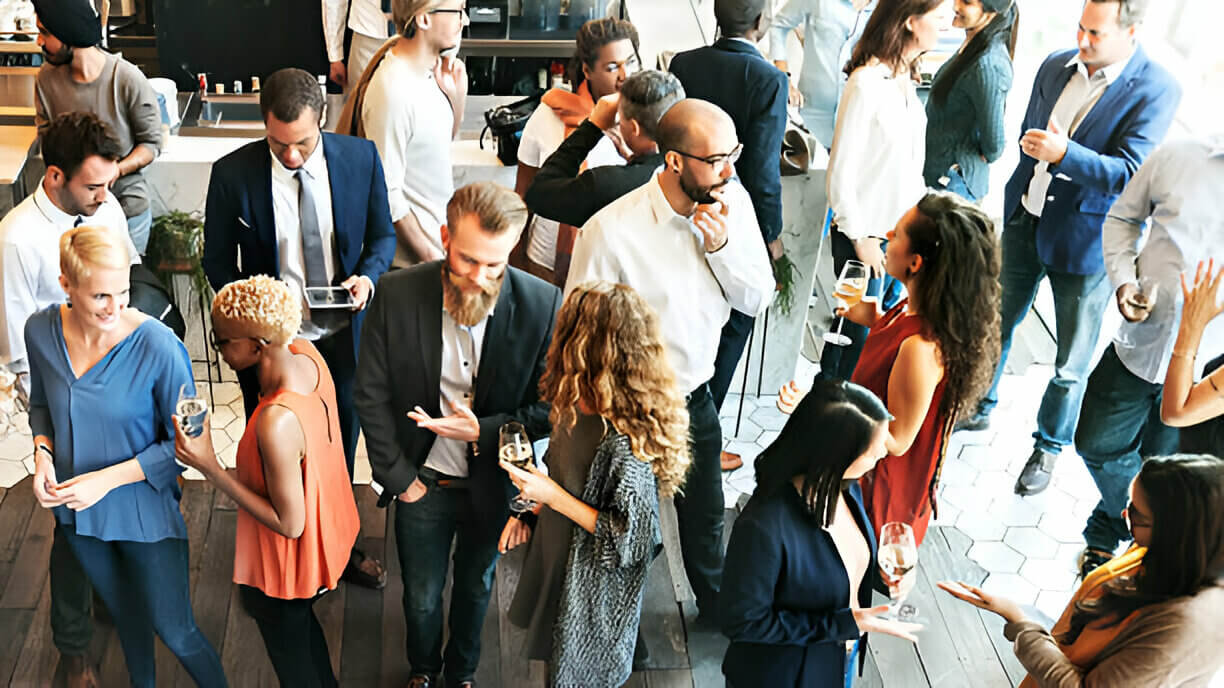As an event planner, it can be very easy to get overwhelmed and confused with the different types of events there are. Each event has its own unique purpose, target audience, and desired outcomes, making it crucial for organizers to grasp the subtle nuances that distinguish one kind of event from another.
Understanding these differences is essential to ensure that the events you plan and execute are not only successful but also effectively meet the goals and expectations of your clients and attendees.
Every event has a different objective or goal, and as the organizer, it is important that you understand each subtle nuance to ensure that the events you organize are considered a success.
In this article, we are going to help you understand the different categories of events you can host, their specific characteristics, and how to tailor your planning approach to each one.
By the end of this guide, you will be equipped with the knowledge and insights necessary to organize events that leave a lasting impact and exceed the expectations of everyone involved.
Types of Corporate Events

Most of the types of gatherings in event management generally fall in the business category as they are in high demand. Corporate events are professional gatherings organized by companies or organizations for their employees, stakeholders, or clients.
These events can serve various purposes, such as training, team building, product launches, or celebrations, and are designed to align with the organization’s goals, values, and culture. Here are some examples:
Awards & Ceremonies
 Awards and ceremonies are events that recognize and celebrate the achievements, milestones, or contributions of individuals, teams, or organizations within a company or industry.
Awards and ceremonies are events that recognize and celebrate the achievements, milestones, or contributions of individuals, teams, or organizations within a company or industry.
These kinds of events often include a formal presentation of awards, speeches, and entertainment, creating a memorable experience for attendees.
The objective is to boost morale, foster a sense of pride, and motivate employees or industry members to continue striving for excellence.
For awards and ceremonies, event organizers generally bring in big name keynote speakers and celebrity speakers to make a lasting impression on the audience.
Banquet
 A banquet is a formal dinner event typically held to honor individuals, celebrate achievements, or mark special occasions within an organization.
A banquet is a formal dinner event typically held to honor individuals, celebrate achievements, or mark special occasions within an organization.
This event theme often include a seated meal, speeches, and entertainment, providing an opportunity for attendees to socialize and network in a festive atmosphere.
The goal is to create a memorable experience that strengthens relationships and reinforces a sense of community within the organization.
Brand Activation
 Brand activation events are experiential marketing initiatives designed to engage consumers and create a strong emotional connection between the audience and a specific brand.
Brand activation events are experiential marketing initiatives designed to engage consumers and create a strong emotional connection between the audience and a specific brand.
This event genre often involve interactive elements, product demonstrations, or immersive experiences that allow attendees to physically interact with the brand and its offerings.
The objective of brand activation events is to create a memorable and positive association with the brand, increasing brand awareness, loyalty, and advocacy among the target audience.
By providing hands-on experiences and personalized interactions, these events can effectively showcase the brand’s personality, values, and unique selling points, leaving a lasting impact on attendees.
Brand activation events can take place in various settings, such as public spaces, retail stores, or at larger industry events, and are tailored to the specific goals and target audience of the brand.
Organizations like to bring in a marketing speaker or branding speaker to help guide them in this process.
Charity & Fundraising
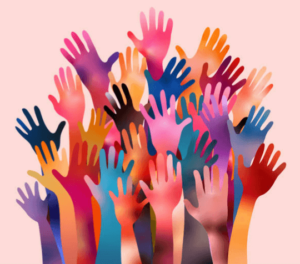 Charity and fundraising events are organized to raise money and awareness for a specific cause or non-profit organization.
Charity and fundraising events are organized to raise money and awareness for a specific cause or non-profit organization.
These events can take various forms, such as galas, auctions, or sporting events, and often include entertainment, food, and opportunities for attendees to contribute to the cause.
The objective is to engage attendees, generate support, and raise funds to further the mission of the organization.
It is very common for an organizer to bring in a motivational speaker to help stir up the crowd with the hopes of getting them to donate to their cause.
Company Parties
 Company parties are festive events that unite employees, creating a sense of camaraderie and appreciation within the organization. These type of gatherings provide an opportunity to celebrate collective achievements, recognize important milestones, and boost morale among team members.
Company parties are festive events that unite employees, creating a sense of camaraderie and appreciation within the organization. These type of gatherings provide an opportunity to celebrate collective achievements, recognize important milestones, and boost morale among team members.
While the primary focus of company parties is often on fun and relaxation, event planners can still set specific objectives, such as facilitating interdepartmental connections, strengthening company culture, and expressing gratitude for the hard work and dedication of employees.
Very often organizers will bring in an inspirational speaker to help them celebrate their accomplishments and inspire their employees.
Conferences
 Conferences are large-scale events that bring together professionals from a specific industry or field to share knowledge, discuss trends, and network with peers.
Conferences are large-scale events that bring together professionals from a specific industry or field to share knowledge, discuss trends, and network with peers.
This event format typically includes keynote speakers, breakout sessions, panel discussions, exhibitions, and providing attendees with opportunities to learn, collaborate, and grow professionally.
The goal is to foster innovation, promote best practices, and facilitate connections within the industry. Organizers like to bring in big name conference speakers to get the audience excited about learning new industry trends.
Conventions
 Conventions are similar to conferences but are typically larger in scale and focused on a specific industry, profession, or fandom.
Conventions are similar to conferences but are typically larger in scale and focused on a specific industry, profession, or fandom.
This style of event often includes a mix of educational sessions, networking opportunities, and exhibitions, allowing attendees to connect with like-minded individuals and stay up-to-date on the latest trends and developments in their field.
The objective is to create a platform for knowledge sharing, collaboration, and community building.
Expos
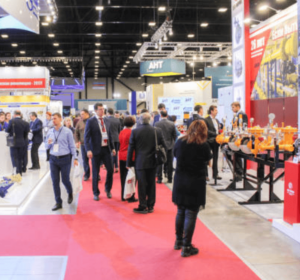 Expos, short for exhibitions, are events that showcase products, services, or innovations within a specific industry.
Expos, short for exhibitions, are events that showcase products, services, or innovations within a specific industry.
These events typically feature exhibits, demonstrations, and presentations from various companies, allowing attendees to explore the latest offerings and connect with potential suppliers or partners.
The goal is to generate leads, build brand awareness, and facilitate business relationships within the industry.
Fashion
 Fashion events, such as fashion shows or product launches, are designed to showcase new clothing lines, accessories, or fashion-related products.
Fashion events, such as fashion shows or product launches, are designed to showcase new clothing lines, accessories, or fashion-related products.
This classification of event often features runway shows, presentations, and opportunities for attendees to interact with designers and brand representatives.
The objective is to generate buzz, attract media attention, and create a memorable experience that promotes the brand and its latest offerings.
Hybrid
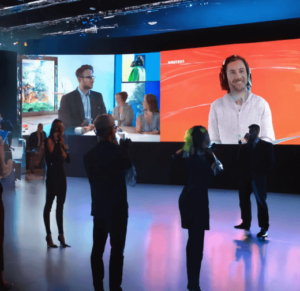 Hybrid events combine elements of both in-person and virtual events, allowing attendees to participate either physically or remotely.
Hybrid events combine elements of both in-person and virtual events, allowing attendees to participate either physically or remotely.
These events often include live streaming, interactive digital platforms, and opportunities for remote attendees to engage with speakers and other participants.
The goal is to expand reach, increase accessibility, and provide a flexible and inclusive experience for all attendees.
Leadership Summit
 Leadership summits are events designed for high-level executives, managers, and decision-makers to come together and discuss leadership strategies, challenges, and best practices.
Leadership summits are events designed for high-level executives, managers, and decision-makers to come together and discuss leadership strategies, challenges, and best practices.
These events often include keynote speakers, panel discussions, and networking opportunities, providing a platform for leaders to learn from each other and develop their leadership skills.
Very often event planners will hire business speakers and CEO speakers to explore latest trends and industry best practices. The objective is to inspire, educate, and empower leaders to drive organizational success.
Lunch & Learn
 Lunch and learn events are informal training or educational sessions that take place during lunchtime.
Lunch and learn events are informal training or educational sessions that take place during lunchtime.
These events typically feature a guest speaker or expert who presents on a specific topic, allowing attendees to learn and develop new skills while enjoying a meal.
The goal is to provide accessible and engaging learning opportunities that fit into the busy schedules of professionals.
Meetings
 Meetings are gatherings of individuals within an organization or across organizations to discuss specific topics, make decisions, or collaborate on projects.
Meetings are gatherings of individuals within an organization or across organizations to discuss specific topics, make decisions, or collaborate on projects.
These events can range from small team meetings to large-scale board meetings and can be held in-person, virtually, or in a hybrid format.
Event planners like to bring in outside speakers on topics such as DEI, workplace culture, and employee engagement to help inspire collaboration. The objective is to facilitate communication, align goals, and drive progress on important initiatives.
Networking
 Networking events are designed to help professionals connect, build relationships, and expand their professional networks.
Networking events are designed to help professionals connect, build relationships, and expand their professional networks.
These events can take various forms, such as cocktail receptions, speed networking sessions, or industry mixers, and often provide a relaxed atmosphere for attendees to interact and exchange ideas.
The goal is to foster collaboration, generate business opportunities, and support career growth.
Product Launches
 Product launch events are designed to introduce new products or services to the market, generating excitement and buzz among potential customers, media, and industry influencers.
Product launch events are designed to introduce new products or services to the market, generating excitement and buzz among potential customers, media, and industry influencers.
These events often include demonstrations, presentations, and opportunities for attendees to interact with the product and brand representatives.
The objective is to create a memorable experience that promotes the new offering and drives sales.
Recruiting
 Recruiting events, such as job fairs or campus recruitment events, are designed to help organizations attract and engage potential job candidates.
Recruiting events, such as job fairs or campus recruitment events, are designed to help organizations attract and engage potential job candidates.
These events provide opportunities for employers to showcase their company culture, career opportunities, and benefits, while allowing job seekers to learn more about potential employers and network with hiring managers.
Event planners like to bring in HR speakers and Future of Work speakers to help facilitate these types of events. The goal is to facilitate the recruitment process and help organizations find top talent.
Retreats
 Retreats are off-site events that bring together members of an organization or team to focus on strategic planning, team building, or professional development.
Retreats are off-site events that bring together members of an organization or team to focus on strategic planning, team building, or professional development.
These events often take place in a relaxed, off-site setting and include a mix of structured activities, workshops, and leisure time, allowing attendees to disconnect from their daily routines and focus on growth and collaboration.
The objective is to strengthen relationships, align goals, and create a sense of unity and purpose within the organization.
Sales Kickoff
 Sales kickoff events are annual meetings that bring together an organization’s sales team to celebrate past successes, set goals for the coming year, and provide training and motivation.
Sales kickoff events are annual meetings that bring together an organization’s sales team to celebrate past successes, set goals for the coming year, and provide training and motivation.
These events often include sales speakers, breakout sessions, and team-building activities, designed to energize and inspire the sales team.
The goal is to align the team around key objectives, provide the tools and knowledge needed for success, and foster a sense of camaraderie and shared purpose.
Seminars
 Seminars are educational events that focus on a specific topic or skill set, providing attendees with in-depth knowledge and practical insights.
Seminars are educational events that focus on a specific topic or skill set, providing attendees with in-depth knowledge and practical insights.
These events often feature expert speakers on hot topics such as innovation, disruption, and digital transformation providing opportunities for attendees to ask questions and engage in discussions.
The objective is to provide targeted learning experiences that help professionals develop new skills, stay up-to-date on industry trends, and advance their careers.
Team Building
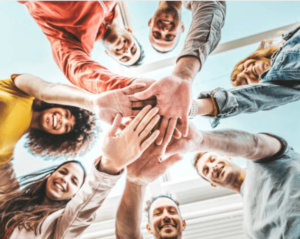 Team building events are designed to strengthen relationships, improve communication, and develop collaboration among members of a team or organization.
Team building events are designed to strengthen relationships, improve communication, and develop collaboration among members of a team or organization.
These events can take various forms, such as outdoor adventures, escape rooms, or group challenges, and often involve activities that require teamwork, problem-solving, and trust.
Planners like to bring in team building speakers to create strong engagement throughout the event. The goal is to create shared experiences that break down barriers, build camaraderie, and enhance team performance.
Trade Shows
 Trade shows are large-scale events that bring together companies and professionals from a specific industry to showcase products, services, and innovations.
Trade shows are large-scale events that bring together companies and professionals from a specific industry to showcase products, services, and innovations.
These events typically feature exhibits, demonstrations, and educational sessions, providing attendees with opportunities to explore the latest offerings, network with peers, and generate business leads.
The objective is to create a platform for industry members to connect, collaborate, and stay informed about the latest trends and developments.
Virtual Summit
 Virtual summits are online conferences that bring together experts, thought leaders, and professionals from a specific industry or field to share knowledge, discuss trends, and provide insights.
Virtual summits are online conferences that bring together experts, thought leaders, and professionals from a specific industry or field to share knowledge, discuss trends, and provide insights.
These events typically include a series of guest speakers, live sessions, and interactive discussions, allowing attendees to learn and engage from the comfort of their own devices.
The goal is to provide accessible and convenient learning opportunities that transcend geographical boundaries and support professional growth.
Webinars
 Webinars are online seminars or presentations that allow attendees to learn about a specific topic or skill set from the comfort of their own devices.
Webinars are online seminars or presentations that allow attendees to learn about a specific topic or skill set from the comfort of their own devices.
These events typically feature expert speakers, interactive elements, and opportunities for attendees to ask questions and engage in discussions.
The objective is to provide accessible and targeted learning experiences that help professionals develop new skills, stay informed about industry trends, and advance their careers.
Workshops
 Workshops are interactive training events that focus on developing specific skills or knowledge through hands-on learning and practice.
Workshops are interactive training events that focus on developing specific skills or knowledge through hands-on learning and practice.
These events often involve small groups of attendees working together under the guidance of an expert facilitator, engaging in exercises, discussions, and problem-solving activities.
The goal is to provide immersive and practical learning experiences that help professionals build confidence, master new skills, and apply their learning in real-world situations.
Types of Community Events
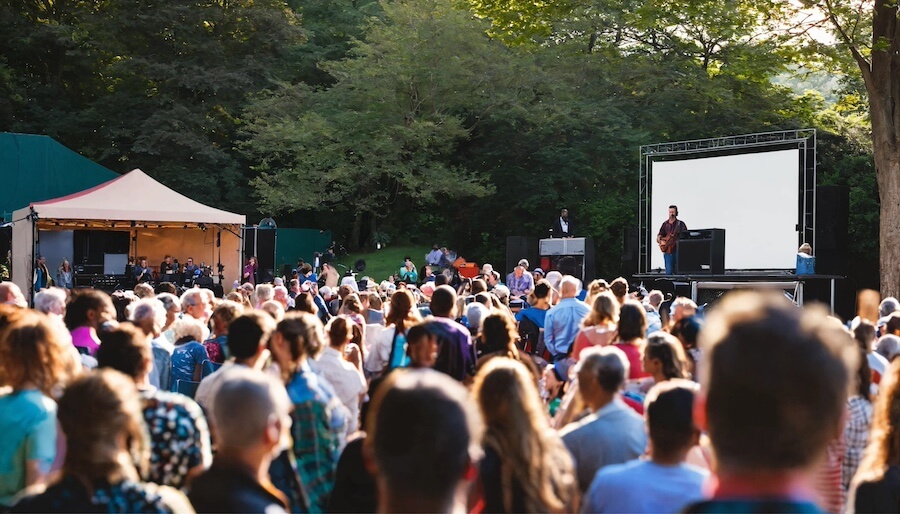
Community events are gatherings organized by and for members of a specific community, designed to foster social connections, celebrate shared values, and promote a sense of belonging.
These events can range from small-scale neighborhood gatherings to larger festivals and fairs, and often reflect the unique cultural, historical, or geographical characteristics of the community. Here are some examples:
Arts & Cultural (Theatrical)
Arts and cultural events, such as theatrical performances, concerts, or art exhibitions, are designed to celebrate and showcase the creative talents within a community.
These events often take place in local theaters, galleries, or community centers and provide opportunities for residents to engage with the arts, experience diverse cultural expressions, and support local artists.
The objective is to enrich the cultural fabric of the community, foster appreciation for the arts, and bring people together through shared experiences.
Fairs
Fairs are community events that typically feature a variety of attractions, such as amusement rides, games, live entertainment, and food vendors.
These events often take place in local parks, fairgrounds, or streets and provide a festive atmosphere for families and community members to come together, socialize, and enjoy fun activities.
The goal is to create a sense of community spirit, celebrate local traditions, and provide entertainment for all ages.
Field Marketing Events
Field marketing events are community-based initiatives designed to promote a specific product, service, or cause directly to the target audience.
These events can take various forms, such as product samplings, demonstrations, or experiential activations, and often take place in high-traffic areas or at local events.
The objective is to engage with the community, raise brand awareness, and drive conversions through face-to-face interactions and memorable experiences.
Food
Food events, such as farmers’ markets, food festivals, or culinary competitions, are designed to celebrate local cuisine, showcase culinary talents, and promote healthy eating habits within a community.
These events often feature local farmers, artisanal food producers, and chefs, providing opportunities for attendees to sample fresh produce, try new dishes, and learn about the culinary traditions of their community.
The goal is to support local food systems, foster a sense of community around food, and promote a vibrant and sustainable food culture.
Grand Opening
Grand opening events are designed to celebrate the launch of a new business, facility, or community space, generating excitement and awareness among local residents.
These events often include ribbon-cutting ceremonies, tours, demonstrations, and special promotions, providing opportunities for the community to explore the new offering and meet the people behind it.
The objective is to create a memorable experience that builds buzz, attracts customers or visitors, and establishes the new venture as a valuable addition to the community.
Pop-up Events
Pop-up events are temporary, short-term experiences that emerge in unexpected locations within a community, often with the goal of surprising and delighting attendees.
These events can take various forms, such as retail shops, art installations, or dining experiences, and are designed to create a sense of excitement, urgency, and exclusivity.
Pop-up events are often used to test new concepts, generate buzz, or engage with the community in a unique and memorable way.
The objective is to create a sense of novelty and spontaneity, while providing attendees with a distinctive and often fleeting experience that leaves a lasting impression.
By popping up in surprising locations and offering limited-time experiences, these events can generate significant interest and engagement within the community.
Public Lectures
Public lectures are educational events that feature expert speakers on education presenting on topics of interest or relevance to the community.
These events often take place in libraries, community centers, or educational institutions and provide opportunities for attendees to learn, engage in discussions, and explore new ideas.
The goal is to promote lifelong learning, foster civic engagement, and stimulate intellectual curiosity within the community.
Reunion
Reunion events bring together people who share a common bond, such as former classmates, family members, or members of an organization, to reconnect, reminisce, and celebrate their shared history.
These events often include social activities, group meals, and opportunities for attendees to catch up and strengthen their relationships.
The objective is to generate a sense of belonging, preserve shared memories, and reinforce the ties that bind a community together.
School & Graduation
School and graduation events are designed to celebrate the academic achievements and milestones of students within a community.
These events can include school plays, talent shows, award ceremonies, and commencement exercises, providing opportunities for students to showcase their talents, be recognized for their achievements, and share their success with family and friends.
The goal is to create a sense of pride, encourage academic excellence, and bring the community together to support and celebrate its young people. For graduation ceremonies, event planners like to bring in graduation keynote speakers to help connect and inspire the audience.
Social
Social events, such as block parties, picnics, or holiday celebrations, are designed to bring community members together in a relaxed and festive atmosphere. T
hese events often include food, games, and entertainment, providing opportunities for neighbors to meet, socialize, and build relationships.
The objective is to promote a sense of community spirit, strengthen social bonds, and create a welcoming and inclusive environment for all residents.
Sports
Community sports events, such as local tournaments, charity races, or youth sports leagues, are designed to promote physical activity, teamwork, and friendly competition among residents.
These events often take place in local parks, sports facilities, or community centers and provide opportunities for participants to challenge themselves, develop new skills, and build camaraderie with their teammates and competitors.
The goal is to inspire a sense of community pride, encourage healthy lifestyles, and bring people together through shared passion for sports.
Types of Music Events
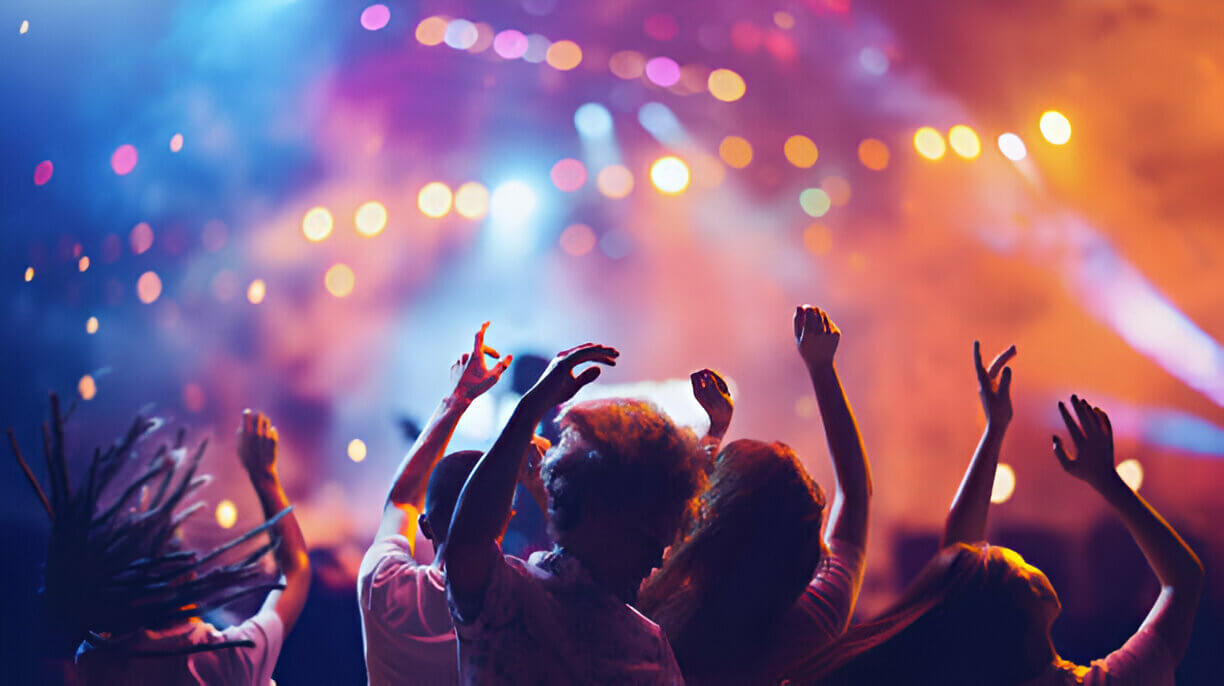
Music events are live performances or gatherings that showcase various musical genres, artists, and styles, designed to entertain and engage audiences through the power of sound and rhythm.
These events can range from intimate concerts in small venues to large-scale music festivals attracting thousands of attendees, catering to diverse musical tastes and creating immersive experiences that celebrate the artistry and emotion of music. Here are some examples:
Concerts
Concerts are live music performances featuring one or more artists, typically held in venues such as concert halls, arenas, or outdoor stages.
These events cater to fans of specific genres, artists, or bands and provide an immersive experience through high-quality sound, lighting, and visuals.
The objective of concerts is to create a memorable and emotionally engaging experience for attendees, allowing them to connect with the music and the artists they admire.
Festivals
Music festivals are large-scale events that feature multiple artists and bands performing across several stages over the course of one or more days.
These events often take place in outdoor settings, such as parks or dedicated festival grounds, and attract attendees from far and wide. Festivals typically offer a diverse lineup of music genres, as well as food and beverage vendors, art installations, and other interactive experiences.
The goal of music festivals is to create a vibrant and immersive atmosphere that celebrates music, culture, and community, providing attendees with a unique and unforgettable experience.
Nightclubs
Nightclub events are music-focused gatherings that take place in clubs or other late-night venues, featuring live performances by DJs, electronic music producers, or other musical acts.
These events cater to a more dance-oriented crowd and often include state-of-the-art sound systems, lighting, and visual effects to create an immersive and high-energy atmosphere.
The objective of nightclub events is to provide a space for music enthusiasts to socialize, dance, and experience cutting-edge music in a lively and exciting setting.
Types of Personal Events

Personal events are gatherings or celebrations that mark significant milestones, achievements, or life events. These events are typically intimate in nature, involving family, friends, and loved ones, and are designed to honor, support, and celebrate the individual at the center of the occasion, creating lasting memories and strengthening personal bonds. Here are some examples:
Anniversaries
Anniversary events celebrate the completion of a specific number of years since a significant event, such as a wedding or the founding of a company.
These events provide an opportunity for couples, families, or organizations to reflect on their journey, renew their commitment, and celebrate their achievements.
Anniversary celebrations can range from intimate dinners to large-scale parties and often include elements such as speeches, toasts, and the sharing of memories.
The objective of anniversary events is to honor the enduring nature of relationships and accomplishments, while creating new memories and strengthening the bonds between participants.
Birthdays
Birthday celebrations are personal events that mark an individual’s annual milestone and provide an opportunity for friends and family to gather and celebrate the person’s life.
These events can range from small, intimate gatherings to large, elaborate parties and often include elements such as cake, gifts, decorations, and games.
The objective of birthday celebrations is to create a warm and joyful atmosphere that honors the individual, strengthens social bonds, and creates lasting memories.
Holidays
Holiday events are personal celebrations that mark significant cultural, religious, or national occasions, such as Christmas, New Year’s Eve, or Thanksgiving.
These events often involve gatherings of family and friends, special meals, decorations, and traditions that are unique to each holiday.
The objective of holiday celebrations is to create a sense of joy, connection, and shared meaning, while honoring the cultural or religious significance of the occasion.
Holiday events provide an opportunity for people to come together, strengthen their bonds, and create lasting memories that are tied to the recurring rhythm of these special times of the year.
Showers (Baby & Bridal)
Showers, such as baby showers and bridal showers, are personal events that celebrate significant milestones in an individual’s life, such as the upcoming birth of a child or a wedding.
These events are typically hosted by friends or family members and provide an opportunity for guests to offer gifts, advice, and support to the guest of honor. Showers often include themed decorations, games, and refreshments, creating a festive and supportive atmosphere.
The goal of showers is to help the guest of honor prepare for their upcoming life change, while fostering a sense of community and celebration among their loved ones.
Weddings
Weddings are personal events that celebrate the union of two people in marriage. These events are typically highly personalized and reflect the couple’s unique style, cultural background, and values.
Weddings often include ceremonies, receptions, and other traditions, such as exchanging vows, cutting the cake, and dancing.
The goal of a wedding is to create a meaningful and memorable experience that marks the beginning of a couple’s life together and allows them to share their love and commitment with their closest friends and family.
How To Choose the Right Type of Event Format

When you are examining the different types of events that you can produce, it is important to focus on two key factors:
1. What are you as an organization trying to accomplish?
2. What do your attendees want?
At the end of the day, an event is only successful when your attendees are happy and satisfied with the experience, but you also need to ensure that the time and money you have invested has paid off.
To help guide your decision-making process, take a moment to write down the top three results your organization is aiming to achieve through the event. Next, do the same for your attendees, considering their expectations and desired outcomes.
It’s crucial to understand the steps involved in identifying goals and Key Performance Indicators (KPIs), establishing means of measurement, reviewing costs, and preparing post-event reports that truly capture the impact of your event.
Pro Tip: If you are not sure which event type is right for you, consult your network at your local event planning association. These are people who have a great deal of experience and can help guide you.
By carefully evaluating these key factors, you can narrow down the event formats that best align with both your organizational goals and the needs of your target audience, setting the stage for a successful and impactful event.
